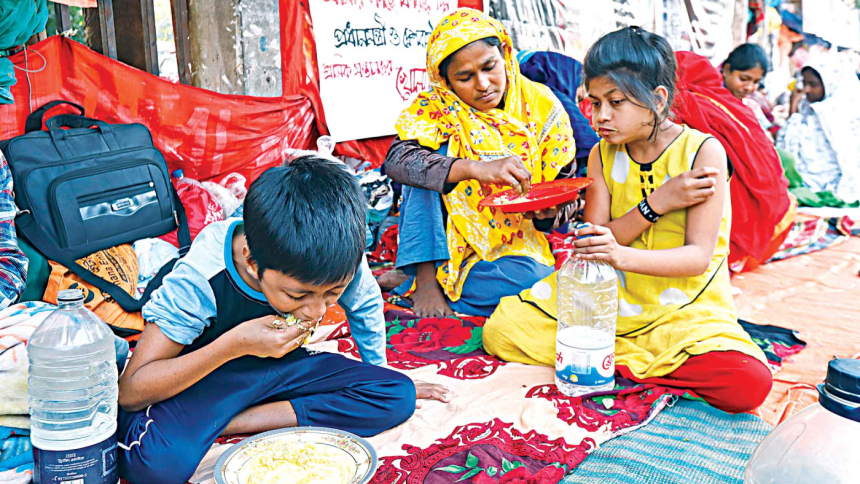Tazreen Tragedy: ‘Got neither a penny, nor a fistful of rice’

Since the Tazreen Fashions factory fire on November 24, 2012, former senior sewing machine operator Shilpi Akter has left no stone unturned to support herself and her family of five, even though she had lost her ability for labour-intensive work.
Shilpi, the sole bread-winner of her family, cannot remember when last she ate meat.
"I didn't even buy fish for nearly a month. I never buy fresh vegetables from the market and instead depend on leftover or rejected ones. For the past two months, I have not been able to send money to my 11-year-old daughter who lives in the village with my mother and two sisters -- one is mentally imbalanced and another divorced with a daughter," she said yesterday.
Shilpi said she had joined more than five factories over the last eight years, but could not work for than 15 days at each as she was not able to sit or stand too long due to the severe injuries she sustained to her spinal cord and head during the fire incident.
Since the gate was locked on that tragic day exactly eight years ago, she blacked out after being trampled by workers in the mad rush to escape the flames.
Having no relative or acquaintance in the city, Shilpi initially went to her village home at Patuakhali's Kalapara and started taking paracetamols from a nearby dispensary for her pain. After around five months, when she was still unable to walk properly due to the intolerable pain and having no money, no access to food on credit, but loans aplenty, she had to return to Dhaka.
"I had to take regular treatment from many hospitals, including CRP [Centre for the Rehabilitation of the Paralysed] in Savar."
"But I got neither a penny, nor a fistful of rice from the government or any NGO, although I lost my ability to work permanently," said Shilpi.
"Around four years ago, with Tk 10,000 taken from a local worker leader in Savar, I started selling ladies' undergarments door to door, worked as domestic help, but I couldn't continue to work due to my physical condition."
Currently, Shilpi sells winter pithas, betel nuts and cigarettes in a makeshift tea stall in Ashulia. But her income has dried up due to the Covid-19 pandemic, causing hardships in paying rent and sending money to the village from her meagre income.
30-year-old Mosammat Rehena Begum, who has been staging demonstrations with 44 other former workers of Tazreen Fashions for the past 69 days outside the National Press Club, said she had to stop the education of her two school-going children, as the lone income of her rickshaw-puller husband cannot cover family expenses anymore.
The then senior sewing machine operator Rehena had jumped from the third floor to escape the fire and sustained injuries to her spinal cord, hand and head. She said she only received a voluntary donation worth Tk 3.5 lakh in 2016, which was not enough for her treatment.
"Even today, I can't stop having painkillers for a single day. I cannot even clean my room, let alone work jobs," she said.
The same fire killed her elder sister, brother-in-law, their son and their daughter-in-law. "If I knew then that I would have to beg like this, I wouldn't have jumped," she said. "I will not return empty-handed, even if I need to die here [staging demonstrations]."
Jorina Begum, who was also demonstrating, still cannot sit or stand for too long as three rods had pierced her bones and flesh when she jumped from the third floor of the building. She said her husband left her years ago and her elderly mother had to take care of her and her two children.
"I have mouths to feed and loans to repay, as my mother is getting older and sick. I don't know about my future. On November 24, I will go to the Prime Minister's Office dressed in a shroud along with the other demonstrators with my three-point demand -- compensation, rehabilitation, and long-term medical treatment," she added.
COMPENSATION OR ALMS?
Although labour activists have long been arguing that the compensation for permanently disabled workers should be equal to at least their lifetime's earnings as per the Bangladesh labour Act, the amount of compensation is Tk 1 lakh in case of death, and Tk 1.25 lakh each in case of permanent disability.
According to the final report of the executive commissioner to Tazreeen Claims Administration (TCA) Coordination Committee, 90 injured workers were paid Tk 1 lakh each from BGMEA, and 14 injured workers were paid Tk 50,000 each from the Prime Minister' Office as compensation.
However, Shahidul Islam Sabuj, general secretary, Garments Workers Unity Forum, said 173 workers were listed for compensation, and only 45 injured workers have gotten some voluntary donations.
According to Sabuj, among the 45 workers, 35 have been sitting idle at home due to permanent disability, while 10 can never do hard labour.
"But they spent more than Tk 2 lakh for their treatment. Still, they haven't received any assurance about getting a dignified compensation. Around 45 days ago, the representatives of BGMEA and Bangladesh Labour Welfare Foundation came and took their names. We can't reach them anymore," he said.


 For all latest news, follow The Daily Star's Google News channel.
For all latest news, follow The Daily Star's Google News channel. 



Comments